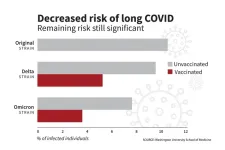(Press-News.org) A landmark study from researchers at Huntsman Cancer Institute at the University of Utah (the U), the Spencer Fox Eccles School of Medicine at the U, and Boston University Chobanian & Avedisian School of Medicine found that women with severe endometriosis are 10 times more likely to get ovarian cancer, compared to women who do not have the disease.
Prior studies have shown a causal connection between endometriosis and ovarian cancer. But in using the Utah Population Database—a repository of linked health records housed at Huntsman Cancer Institute—investigators were able to analyze the incidence rates of different types of endometriosis and subtypes of ovarian cancer for the first time.
Their research, which included a cohort of over 78,000 women with endometriosis, has been published in the Journal of the American Medical Association.
“These are really important findings,” says Jennifer Doherty, PhD, MS, investigator and co-leader of the Cancer Control and Population Sciences Program at Huntsman Cancer Institute and professor of the population health sciences department at the U. “This impacts clinical care for individuals with severe endometriosis, since they would benefit from counseling about ovarian cancer risk and prevention. This research will also lead to further studies to understand the mechanisms through which specific types of endometriosis cause different types of ovarian cancer.”
The project began as a collaboration between Doherty, Mollie Barnard, ScD, an assistant professor of medicine at Boston University Chobanian & Avedisian School of Medicine, and Karen Schliep, PhD, MSPH, associate professor of public health at the U. Schliep served as senior and corresponding author of the study.
“Karen [Schliep] was researching endometriosis, and Mollie [Barnard] and I were working on ovarian cancer. We mutually approached each other about putting the data from our two studies together, and that’s how this very powerful combined analysis happened,” says Doherty. “It’s hard to have a large enough study to be able to observe the results we did—all thanks to the Utah Population Database.”
In the Utah-based cohort, researchers found that women suffering from more severe types of endometriosis are more likely to develop type I ovarian cancer.
“That's where we found a 19-fold increased risk, which compares to the connection between smoking and lung cancer,” says Schliep. “As an epidemiologist, seeing numbers like that is really striking.”
In their calculations, they also found that women with any kind of endometriosis have a 4.2-fold risk of developing ovarian cancer compared to those who do not. They also have over 7 times the risk of developing type I ovarian cancer, which is slow to develop but also does not respond well to chemotherapy.
The National Cancer Institute says that ovarian cancer has a five-year survival rate of 50%.
“The big question for women is ‘what can I do about it?’ This is important data for women to have as they're weighing what kind of treatments they should maybe undergo to avoid any kind of disease down the road,” says Schliep. “I’m very passionate about giving women the right information and then having them be able to make shared decisions with their physician.”
As a preventative measure, women with endometriosis could pursue surgeries including a hysterectomy or removal of the ovaries. But these are invasive procedures, and investigators say more research is needed to know if these are the right measures.
Barnard, a former postdoctoral student at Huntsman Cancer Institute, feels hopeful about the study’s ability to make an impact in women’s lives.
“I chose to become an epidemiologist to make a difference in people's lives, and often we're several steps away from drug development or clinical practice,” says Barnard. “But this feels like it's just a few steps away where it might take just a couple of clinical studies or implementation studies to figure out how this information can best be leveraged by doctors and their patients.”
Other Huntsman Cancer Institute researchers who contributed to this landmark study include Britton Trabert, MS, MSPH, PhD, Huong Meeks, PhD, Myke Madsen, MSTAT, Emily Guinto, MS, Lindsay J. Collin, PhD, MPH, and Kathryn Maurer, MD
This study was supported by the National Institutes of Health/National Cancer Institute including P30 CA02014 and Huntsman Cancer Foundation.
What is Endometriosis?
Endometriosis is a disease in which the tissue that lines the uterus grows elsewhere in the pelvic cavity, creating lesions on the ovaries, fallopian tubes, or behind the uterus. An estimated 11% of women in the United States, 6,500,000 in total, have the condition which often leads to chronic pain and infertility.
According to the World Health Organization, the disease presents in three main forms. Superficial endometriosis is mainly seen on the mucous membrane around the pelvic cavity. More severe forms are found as cysts within the ovaries called endometriomas and as deep infiltrating endometriosis, which affects the organs near the uterus, like the ovaries, bladder and bowels.
About Huntsman Cancer Institute at the University of Utah
Huntsman Cancer Institute at the University of Utah is the National Cancer Institute-designated Comprehensive Cancer Center for Utah, Idaho, Montana, Nevada, and Wyoming. With a legacy of innovative cancer research, groundbreaking discoveries, and world-class patient care, we are transforming the way cancer is understood, prevented, diagnosed, treated, and survived. Huntsman Cancer Institute focuses on delivering the highest standard of care and the most advanced treatments, ensuring world-class cancer care is available to all communities in the area we serve. We have more than 300 open clinical trials and 250 research teams studying cancer at any given time. More genes for inherited cancers have been discovered at Huntsman Cancer Institute than at any other cancer center. Our scientists are world-renowned for understanding how cancer begins and using that knowledge to develop innovative approaches to treat each patient’s unique disease. Huntsman Cancer Institute was founded by Jon M. and Karen Huntsman.
END
Landmark study shows elevated cancer risk for women with endometriosis
2024-07-17
ELSE PRESS RELEASES FROM THIS DATE:
Lichtenberg earns GSA’s 2024 Donald P. Kent Award
2024-07-17
The Gerontological Society of America (GSA) — the nation’s largest interdisciplinary organization devoted to the field of aging — has chosen Peter Lichtenberg, PhD, ABPP, FGSA, of Wayne State University as the 2024 recipient of the Donald P. Kent Award.
This distinguished honor is given annually to a GSA member who best exemplifies the highest standards for professional leadership in gerontology through teaching, service, and interpretation of gerontology to the larger society. It was established in 1973 in memory of Donald P. Kent, PhD, for his outstanding leadership in translating research findings ...
Does the type of workstation you use make a difference in your health and productivity?
2024-07-17
It might be an exaggeration to claim that “sitting is the new smoking,” but significant research indicates that people who are sedentary face more health challenges than their active counterparts.
Office workers who spend most of their eight-hour workdays seated, for example, more often experience symptoms such as daytime exhaustion, hypertension and musculoskeletal discomfort than those who are less sedentary. Although devices such as standing desks have been found to alleviate physical symptoms and increase worker productivity, questions remain regarding the best use of the primary types of workstations—stand-biased, ...
Why the most prescribed chemotherapy drug can cause serious heart damage
2024-07-17
There’s still much to learn about how doxorubicin, a 50-year-old chemotherapy drug, causes its most concerning side effects. While responsible for saving many lives, this treatment sometimes causes cardiac damage that stiffens the heart and puts a subset of patients at risk for future heart failure. To better understand and potentially control such complications, Tufts University School of Medicine and Tufts Graduate School of Biomedical Sciences researchers have isolated the immune cells that become overactive when patients take doxorubicin. The team’s findings appear July 17 in the journal Nature Cardiovascular Research.
Doxorubicin ...
Cohen-Mansfield earns GSA’s 2024 Robert W. Kleemeier Award
2024-07-17
The Gerontological Society of America (GSA) — the nation’s largest interdisciplinary organization devoted to the field of aging — has chosen Jiska Cohen-Mansfield, PhD, FGSA, of Tel Aviv University as the 2024 recipient of the Robert W. Kleemeier Award.
This distinguished honor is given annually to a GSA member in recognition for outstanding research in the field of gerontology. It was established in 1965 in memory of Robert W. Kleemeier, PhD, a former president of the Society whose contributions to the quality of life through research in aging were exemplary.
The award presentation will take place at GSA’s ...
Barnes earns GSA’s 2024 James Jackson Outstanding Mentorship Award
2024-07-17
The Gerontological Society of America (GSA) — the nation’s largest interdisciplinary organization devoted to the field of aging — has chosen Lisa L. Barnes, PhD, FGSA, of Rush University Medical Center as the 2024 recipient of the James Jackson Outstanding Mentorship Award.
This distinguished honor is given annually and recognizes individuals who have exemplified outstanding commitment and dedication to mentoring minority researchers in the field of aging. It was renamed in 2021 in memory of James Jackson, PhD, FGSA, a pioneering psychologist ...
Although tiny, peatland microorganisms have a big impact on climate
2024-07-17
The Science
Polyphenols are a diverse group of organic compounds produced by plants. These compounds are often toxic to microorganisms. In peatlands, scientists thought that microorganisms avoided this toxicity by degrading polyphenols using an enzyme that requires oxygen. However, when there is little or no oxygen, like after flooding due to climate induced thawing, the enzyme is inactive, and polyphenols accumulate. This inhibits microbes’ carbon cycling. In this study, scientists mined data for thousands of microbial genomes recovered from Stordalen Mire, an Arctic peatland in Sweden. They discovered that these microorganisms used alternative polyphenol-active ...
Risk of long COVID declined over course of pandemic
2024-07-17
The risk of developing long COVID has decreased significantly over the course of the COVID-19 pandemic, according to an analysis of data led by Washington University School of Medicine in St. Louis.
Researchers attributed about 70% of the risk reduction to vaccination against COVID-19 and 30% to changes over time, including the SARS-CoV-2 virus’s evolving characteristics and improved detection and management of COVID-19.
The research is published July 17 in The New England Journal of Medicine.
“The research on declining rates ...
Learning from Venus: Combining earth system sciences with planetary sciences
2024-07-17
The University of Freiburg is establishing a new tenure track professorship in Earth and Planetary Geodynamics at the Faculty of Environment and Natural Resources, made possible by a 1.71 million euro grant from the Volkswagen Foundation. The new tenure track professorship is part of a comprehensive strategic initiative for combining Earth system sciences with planetary sciences at the University that also includes the establishment of a new Earth System Simulation Lab (EaSySim) and the introduction of an Earth Sciences ...
Texas A&M researchers receive $5 million to study brucellosis in Armenia
2024-07-17
A research team at the Texas A&M School of Veterinary Medicine and Biomedical Sciences (VMBS) has received a $5 million grant from the United States Department of Defense’s Defense Threat Reduction Agency to support the detection and prevention of brucellosis in Armenia.
Brucellosis, which is caused by several bacterial species of Brucella, is a zoonotic disease that can spread to humans from dogs and major livestock species, including cattle, pigs, sheep, and goats. It can have a major impact on a country’s public health and agricultural economy.
The team of Texas A&M researchers, led by VMBS Associate Professor Dr. Angela Arenas, will ...
How effective is MS medication across racial and ethnic groups?
2024-07-17
MINNEAPOLIS – For people with relapsing-remitting multiple sclerosis (MS), a new study has found that the drug ofatumumab is more effective than teriflunomide at helping people across racial and ethnic groups reach a period of no disease activity. The study is published in the July 17, 2024, online issue of Neurology®, the medical journal of the American Academy of Neurology. Ofatumumab, a monoclonal antibody, is a newer drug for treating MS. Teriflunomide, an immunomodulatory agent, has been available for over a decade.
MS is a disease in ...






